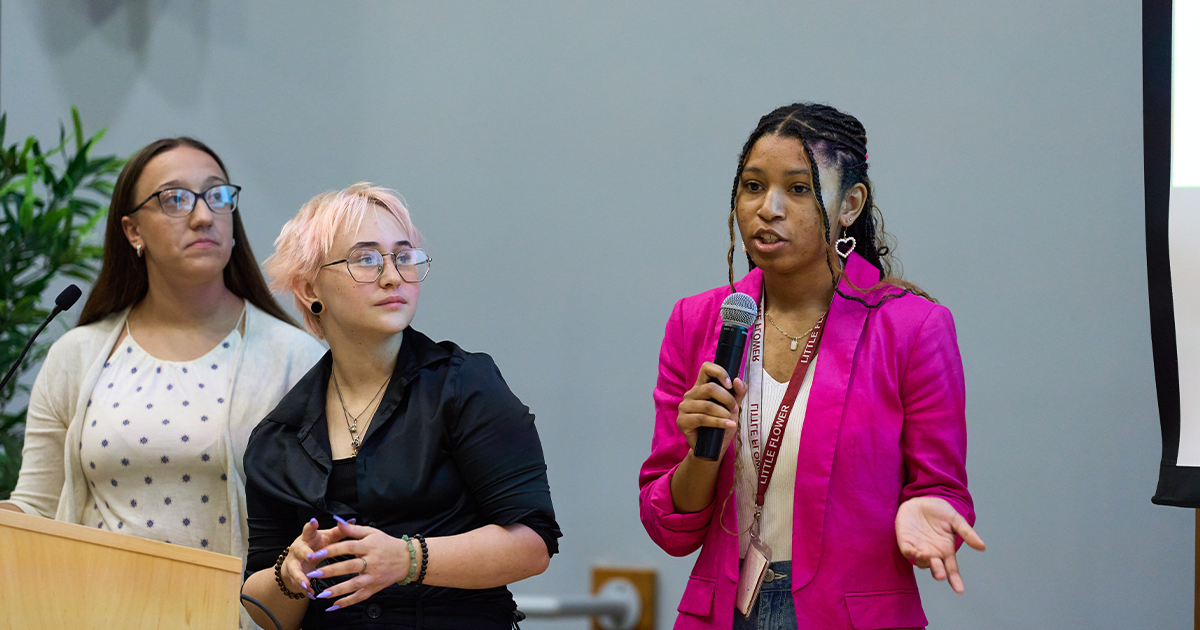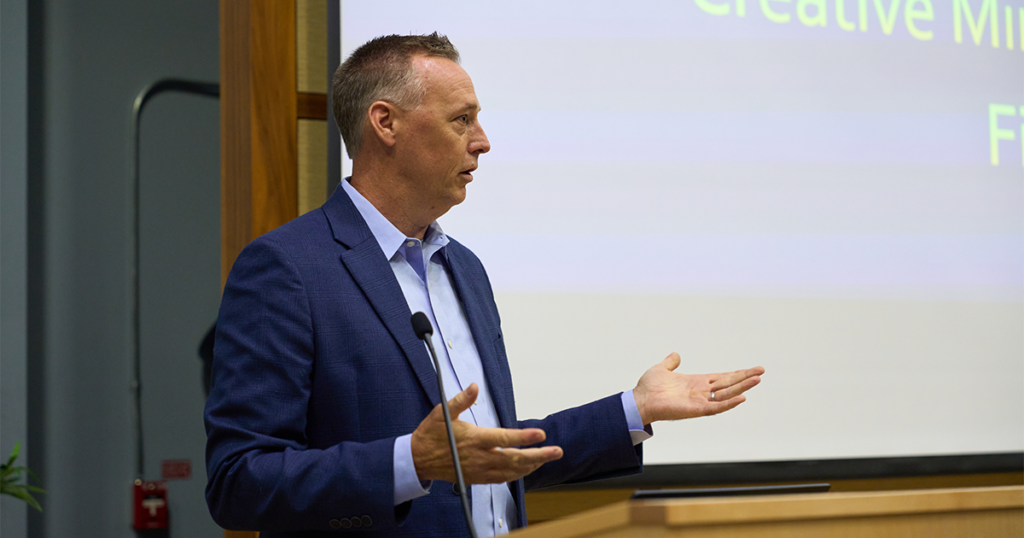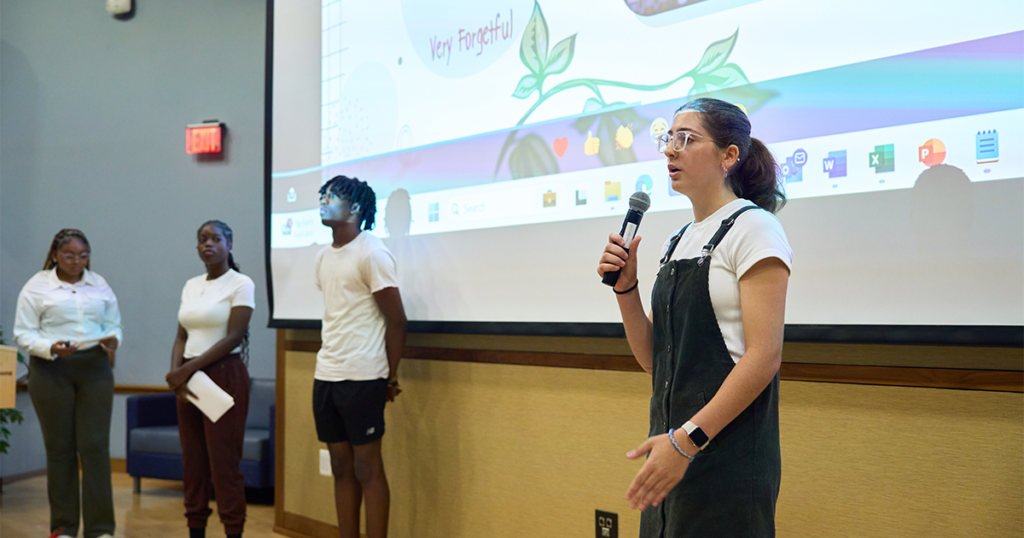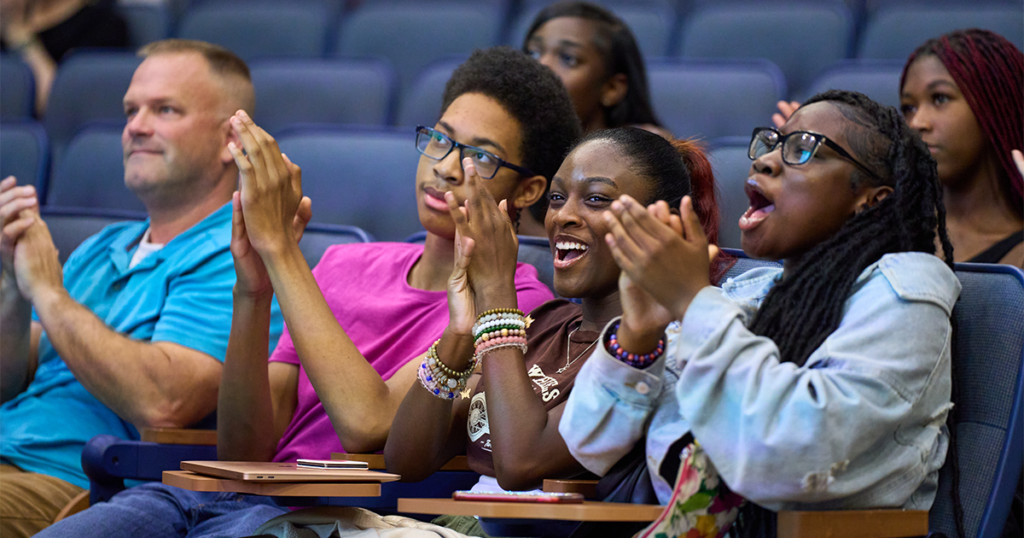La Salle University
In this course, students learned how to think critically and honed their problem-solving skills through addressing a societal problem of concern.

The auditorium in Founder’s Hall took on the feel of a Shark Tank episode on Thursday, July 27.
Students in La Salle’s Early Achievement Program (LEAP) were participating in the Creative Minds Innovative Competition, a new course in the dual enrollment college readiness initiative.
LEAP, one of several dual enrollment opportunities La Salle offers area students, enables rising juniors and seniors attending one of the 15 LEAP partner high schools to take up to 10 courses over seven semesters earning up to 30 college credits.
Taught by La Salle faculty members, LEAP students enroll in one of three themed tracks: exploratory studies, health and human services, or science/business/technology.
“LEAP students especially enjoy the summer semester on La Salle’s campus, taking classes and having the full college experience,” said Jean Landis, Director of Dual Enrollment Pathways. “This summer 250 LEAP students enrolled in the Innovation & Entrepreneurship course, and a second course within their track: Antibiotic Discovery, Consumer Chemistry, or Mathematics: Myths and Realities. After the summer LEAP experience, students shared they had an increased understanding of college expectations and felt more confident about their ability to be successful in college.”
The Creative Minds Competition stemmed from the Innovation & Entrepreneurship course. With a focus on innovation and design thinking, 11 sections of students learned about problem identification, customer empathy, root cause analysis, and other design thinking methods. According to Steve Melick, executive director of the Center for Entrepreneurship at La Salle, the classes used that information to formulate novel solutions through prototyping, and ultimately students developed a proposed solution to address those issues.

“In this experiential course, our LEAP students were challenged and provided the opportunity to learn critical thinking and problem-solving skills to address important humanistic problems facing society daily,” Melick said.
Students independently selected societal issues they were concerned about and wanted to find solutions for.
“From school bullying, gun violence, teen anxiety, news misinformation, and more, students used design thinking methods taught in this course to deeply understand root cause of these issues and ideate to derive novel solutions to improve the conditions of people facing these problems,” he said.
During the competition’s final presentations, student groups took the stage to present their work and answer questions from the audience and judging panel.

Ideas included apps to help with sustainability, mental health, and women of color representation in STEM fields, along with gadgets to help with personal safety.
Jemima Oduwole, a LEAP student from Saints John Neumann and Maria Goretti Catholic High School, presented with her group on creating a better way for people to find truth in media posts.
“Over the course of taking Innovation and Entrepreneurship, I’ve learned how to observe people and their environments with empathy and compassion,” she said. “By using my observation skills, I was able to find a problem in society and use design thinking to try and solve it. With empathy and compassion, I created a prototype for my problem that I believe could change someone’s life. You don’t have to be a designer to use the design thinking system. All you need is to be compassionate about a problem and have the means to try and solve it.”
The idea for the class came from a course in La Salle’s School of Business.

“Albert Einstein once reflected, ‘We can’t solve problems by using the same kind of thinking we used when we created them.’ This illustrates the importance of using new tools and design thinking methods to see and understand problems differently and form answers to these problems that are different and improvements over current solutions,” Melick said. “La Salle’s motto ‘Virtus, Scientia’ translates to ‘Virtue, Knowledge.’ In order to be virtuous and serve others we must increase our knowledge of the problems we face and the best methods for solving those problems. Our students are deeply committed to being part of the solution and we offer a lot of opportunities to learn, engage and improve and this is one more example of that.”
Melik said the overall message to students is to take responsibility, be a help to others, empower themselves and be engaged with their community.
“I hope you take those tools, build your passion, and go out and use it,” he told the audience.
—Meg Ryan